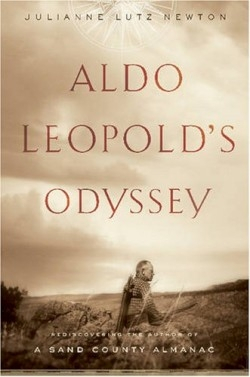Aldo Leopold's Odyssey
Rediscovering the Author of A Sand County Almanac
There is a special class of book, the Book That Changes Lives. Published in 1948, Aldo Leopold’s A Sand County Almanac, bible of conservationists, ecologists, and nature lovers, is one such life-changer, a book as significant to America’s land literature as Walden or Silent Spring. Yet this book was only the most conspicuous of Leopold’s seminal contributions to the cause.
This superb new biography draws on the seemingly inexhaustible trove of writing that the prolific Leopold generated throughout his life. In this mighty auspicious first book, begun as a doctoral dissertation at the University of Illinois-Urbana-Champaign, where she is now a research associate, the author chronicles and interprets Leopold’s twentieth-century intellectual odyssey.
Most readers will associate Leopold with wilderness—for during his years in the U.S. Forest Service he advocated the creation of national wilderness areas and later helped found the Wilderness Society—and with wildlife, for he pioneered the field of game management. His eventful career took him from forestry and range management through policy recommendation to participation in learned conferences that helped shape the science of ecology, and university professorship as well as countless other educational activities.
Aldo Leopold’s Odyssey, however, is distinguished by its agrarian perspective. As a conservationist in his prime during the Dust Bowl era, when the soil’s vulnerability to erosion was apparent to all Americans, Leopold did his part to engender an intelligent public concern for the soil.
Hence Newton’s title also refers to one of the Almanac‘s keystone essays, “Odyssey,” an account of the travels of two atoms of soil, one from an unbroken prairie, one from a hard-used dairy farm. It’s a compact ecological education in nutrient cycling and the functional difference between intact and degraded land.
“Understanding land,” writes Newton, “and having a knowing affection for it were [Leopold] believed, the same thing as using it well and the only nearly sure guarantee of doing so.”
This Odyssey situates Aldo Leopold’s learning experiences in his times. Throughout, Newton discerns the pivotal questions that occupied Leopold, and illuminates the complexity that makes them perennial and provocative today. In addition to receiving a substantial introduction to the work of this extraordinary thinker and writer, the reader will come away from Aldo Leopold’s Odyssey with a particular perspective on the history of the first half of the twentieth century.
This welcome and timely new addition to the Leopold literature reminds readers of Leopold’s abiding hope that sufficient knowledge could promote an ecologically friendly civilization, what he called “a universal symbiosis with land.”
Reviewed by
Stephanie Mills
Disclosure: This article is not an endorsement, but a review. The publisher of this book provided free copies of the book to have their book reviewed by a professional reviewer. No fee was paid by the publisher for this review. Foreword Reviews only recommends books that we love. Foreword Magazine, Inc. is disclosing this in accordance with the Federal Trade Commission’s 16 CFR, Part 255.

